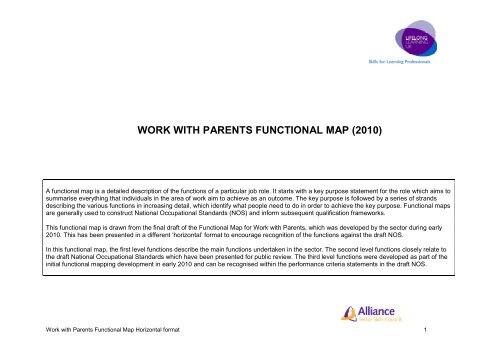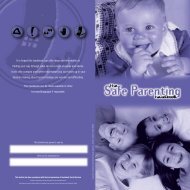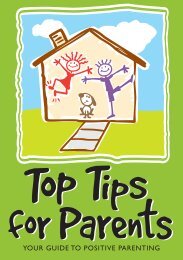Download the Work With Parents Functional Map (2010) - Children in ...
Download the Work With Parents Functional Map (2010) - Children in ...
Download the Work With Parents Functional Map (2010) - Children in ...
You also want an ePaper? Increase the reach of your titles
YUMPU automatically turns print PDFs into web optimized ePapers that Google loves.
WORK WITH PARENTS FUNCTIONAL MAP (<strong>2010</strong>)<br />
A functional map is a detailed description of <strong>the</strong> functions of a particular job role. It starts with a key purpose statement for <strong>the</strong> role which aims to<br />
summarise everyth<strong>in</strong>g that <strong>in</strong>dividuals <strong>in</strong> <strong>the</strong> area of work aim to achieve as an outcome. The key purpose is followed by a series of strands<br />
describ<strong>in</strong>g <strong>the</strong> various functions <strong>in</strong> <strong>in</strong>creas<strong>in</strong>g detail, which identify what people need to do <strong>in</strong> order to achieve <strong>the</strong> key purpose. <strong>Functional</strong> maps<br />
are generally used to construct National Occupational Standards (NOS) and <strong>in</strong>form subsequent qualification frameworks.<br />
This functional map is drawn from <strong>the</strong> f<strong>in</strong>al draft of <strong>the</strong> <strong>Functional</strong> <strong>Map</strong> for <strong>Work</strong> with <strong>Parents</strong>, which was developed by <strong>the</strong> sector dur<strong>in</strong>g early<br />
<strong>2010</strong>. This has been presented <strong>in</strong> a different ‘horizontal’ format to encourage recognition of <strong>the</strong> functions aga<strong>in</strong>st <strong>the</strong> draft NOS.<br />
In this functional map, <strong>the</strong> first level functions describe <strong>the</strong> ma<strong>in</strong> functions undertaken <strong>in</strong> <strong>the</strong> sector. The second level functions closely relate to<br />
<strong>the</strong> draft National Occupational Standards which have been presented for public review. The third level functions were developed as part of <strong>the</strong><br />
<strong>in</strong>itial functional mapp<strong>in</strong>g development <strong>in</strong> early <strong>2010</strong> and can be recognised with<strong>in</strong> <strong>the</strong> performance criteria statements <strong>in</strong> <strong>the</strong> draft NOS.<br />
<strong>Work</strong> with <strong>Parents</strong> <strong>Functional</strong> <strong>Map</strong> Horizontal format 1
FIRST LEVEL FUNCTIONS<br />
1. Develop and ma<strong>in</strong>ta<strong>in</strong> effective partnership work<strong>in</strong>g with<br />
parents with a commitment to safeguard<strong>in</strong>g and promot<strong>in</strong>g <strong>the</strong><br />
welfare of children<br />
2. <strong>Work</strong> with families and o<strong>the</strong>r agencies to assess, provide or<br />
coord<strong>in</strong>ate <strong>in</strong>terventions to meet identified support needs of <strong>the</strong><br />
family<br />
Key Purpose<br />
To work <strong>in</strong> partnership<br />
with parents to<br />
streng<strong>the</strong>n parental<br />
capacity and family<br />
relationships<br />
3. Enable parents to make <strong>in</strong>formed choices around <strong>the</strong>ir parental<br />
role through offer<strong>in</strong>g and provid<strong>in</strong>g learn<strong>in</strong>g opportunities,<br />
<strong>in</strong>formation, guidance and signpost<strong>in</strong>g<br />
4. Facilitate or deliver support and <strong>in</strong>terventions which improve<br />
parental capacity and family relationships<br />
5. Develop and ma<strong>in</strong>ta<strong>in</strong> professional competence and ethical<br />
practice<br />
6. Develop, lead and manage effective parent<strong>in</strong>g services across<br />
all tiers of need<br />
<strong>Work</strong> with <strong>Parents</strong> <strong>Functional</strong> <strong>Map</strong> Horizontal format 2
SECOND TO FOURTH LEVEL FUNCTIONS<br />
KEY AREA 1<br />
1.1.1 Engage <strong>in</strong> open and clear communication with parents<br />
1.1.2 Develop and use a range of approaches to effectively engage with<br />
<strong>Parents</strong><br />
1.1.3 Develop and use a range of approaches to ma<strong>in</strong>ta<strong>in</strong> effective<br />
relationships with parents<br />
1.1.4 Establish relationship ground rules, mutual understand<strong>in</strong>g around<br />
professional boundaries and shared expectations<br />
1.1 Engage with and ma<strong>in</strong>ta<strong>in</strong> effective<br />
supportive and empower<strong>in</strong>g<br />
relationships with parents<br />
1.1.5 Agree how personal <strong>in</strong>formation will be used, recorded and shared with<br />
o<strong>the</strong>rs with<strong>in</strong> confidentiality policies<br />
1.1.6 Establish review and feedback processes with parents and o<strong>the</strong>r<br />
agencies<br />
1.1.7 Develop a partnership approach to shar<strong>in</strong>g <strong>in</strong>formation and decision<br />
mak<strong>in</strong>g with parents<br />
1.1.8 Use a positive approach to build on parent<strong>in</strong>g strengths<br />
1. Develop and<br />
ma<strong>in</strong>ta<strong>in</strong> effective<br />
partnership work<strong>in</strong>g<br />
with parents with a<br />
commitment to<br />
safeguard<strong>in</strong>g and<br />
promot<strong>in</strong>g <strong>the</strong> welfare<br />
of children<br />
1.1.9 Use a collaborative model of help<strong>in</strong>g that acknowledges a parent’s<br />
skills and expertise<br />
1.1.10 <strong>Work</strong> to ensure parent participation <strong>in</strong> shap<strong>in</strong>g and develop<strong>in</strong>g<br />
services<br />
1.1.11 Support parents to campaign and lobby to <strong>in</strong>fluence policy and<br />
practice<br />
1.1.12 Support parents to positively engage with <strong>the</strong>ir community<br />
1.2.1 Identify and negotiate role expectations and responsibilities with<strong>in</strong> <strong>the</strong><br />
relationship<br />
1.2 Agree with parents and o<strong>the</strong>r<br />
agencies <strong>the</strong> aims and purpose of work<br />
with<strong>in</strong> safeguard<strong>in</strong>g policies and<br />
procedures<br />
1.2.2 Agree how <strong>the</strong> child/young person can be supported tak<strong>in</strong>g <strong>in</strong>to<br />
account <strong>the</strong>ir rights and <strong>the</strong> rights of <strong>the</strong>ir parents<br />
1.2.3 <strong>Work</strong> with parents to identify goals, develop and implement parent<strong>in</strong>g<br />
strategies<br />
1.2.4 <strong>Work</strong> with parents to encourage cont<strong>in</strong>u<strong>in</strong>g engagement, review<br />
progress, and challenge where appropriate<br />
1.2.5 Identify and expla<strong>in</strong> sanctions aris<strong>in</strong>g from non-compliance<br />
1.2.6 Def<strong>in</strong>e expectations and work with parents to encourage cont<strong>in</strong>u<strong>in</strong>g<br />
engagement, and challenge where appropriate<br />
<strong>Work</strong> with <strong>Parents</strong> <strong>Functional</strong> <strong>Map</strong> Horizontal format 3
SECOND TO FOURTH LEVEL FUNCTIONS<br />
KEY AREA 2<br />
2.1.1 Ga<strong>the</strong>r and share <strong>in</strong>formation with multi-agency team to <strong>in</strong>form family<br />
assessment<br />
2.1 <strong>Work</strong> with families and o<strong>the</strong>r<br />
agencies to holistically assess <strong>the</strong>ir<br />
<strong>in</strong>terrelated strengths, resources, needs<br />
and risks.<br />
2.1.2 Ga<strong>the</strong>r <strong>in</strong>formation and identify with each family member what <strong>the</strong><br />
family strengths and resources are<br />
2.1.3 Ga<strong>the</strong>r <strong>in</strong>formation and identify with each family member what <strong>the</strong><br />
family needs are<br />
2.1.4 Ga<strong>the</strong>r <strong>in</strong>formation and identify with parents <strong>the</strong> underly<strong>in</strong>g causes of<br />
current difficulties<br />
2. <strong>Work</strong> with families<br />
and o<strong>the</strong>r agencies to<br />
assess, provide or<br />
coord<strong>in</strong>ate<br />
<strong>in</strong>terventions to meet<br />
identified support<br />
needs of family<br />
2.2 <strong>Work</strong> with families and o<strong>the</strong>r<br />
agencies to develop and coord<strong>in</strong>ate <strong>the</strong><br />
delivery of a shared support plan<br />
2.2.1 <strong>Work</strong> with families and o<strong>the</strong>r agencies to identify <strong>the</strong> challenges fac<strong>in</strong>g<br />
<strong>the</strong> family<br />
2.2.2 <strong>Work</strong> with families and o<strong>the</strong>r agencies to prioritise a response to <strong>the</strong><br />
immediate crisis and safeguard and promote <strong>the</strong> welfare of children.<br />
2.2.3 <strong>Work</strong> with families and o<strong>the</strong>r agencies to Identify time limited objectives<br />
<strong>in</strong>volv<strong>in</strong>g <strong>in</strong>cremental change<br />
2.2.4 <strong>Work</strong> from appropriate multiagency forum to agree, implement and<br />
review a shared support plan<br />
2.3 <strong>Work</strong> with parents to enable <strong>the</strong>m<br />
to meet <strong>the</strong> needs of <strong>the</strong>ir family<br />
2.4 – 2.6<br />
See next page<br />
2.3.1 <strong>Work</strong> with parents with physical and mental health issues to <strong>in</strong>crease<br />
<strong>the</strong>ir parent<strong>in</strong>g capacity and sense of efficacy<br />
2.3.2 <strong>Work</strong> with parents to <strong>in</strong>crease learn<strong>in</strong>g and educational achievement<br />
2.3.3 <strong>Work</strong> with parents to streng<strong>the</strong>n positive family relationships<br />
2.3.4 <strong>Work</strong> with parents to create a positive domestic physical environment<br />
2.3.5 <strong>Work</strong> with parents to <strong>in</strong>crease <strong>the</strong>ir f<strong>in</strong>ancial management skills<br />
2.3.6 <strong>Work</strong> with parents to reduce and prevent offend<strong>in</strong>g behaviour and<br />
mitigate <strong>the</strong> impact of imprisonment of <strong>the</strong>ir relationship with <strong>the</strong>ir children<br />
2.3.7 <strong>Work</strong> with parents to reduce and prevent anti-social behaviour<br />
<strong>Work</strong> with <strong>Parents</strong> <strong>Functional</strong> <strong>Map</strong> Horizontal format 4
SECOND TO FOURTH LEVEL FUNCTIONS<br />
KEY AREA 2 (cont<strong>in</strong>ued)<br />
2.1 – 2.3<br />
See previous page<br />
2.4 Refer parents to specialist and<br />
o<strong>the</strong>r services when appropriate and<br />
with consent, <strong>in</strong> accordance with<br />
required protocols<br />
2.4.1 Identify when referral is appropriate due to limitations of own role<br />
2.4.2 Identify services families can potentially be referred to<br />
2 4.3 Use assessment <strong>in</strong>formation to identify services relevant for referral<br />
needs<br />
2.4.4 Consult with referral agency to see if family meets threshold criteria<br />
and advocate where necessary<br />
2. <strong>Work</strong> with families<br />
and o<strong>the</strong>r agencies to<br />
assess, provide or<br />
coord<strong>in</strong>ate<br />
<strong>in</strong>terventions to meet<br />
identified support<br />
needs of family<br />
2.5 Enable parents to <strong>in</strong>dependently<br />
access and engage with services<br />
2.4.5 Support parents to engage with referral agency<br />
2.4.6 Monitor family progress and engagement with referred service<br />
2.5.1 <strong>Work</strong> with parents to identify services which will meet family needs<br />
2.5.2 Enable parents to develop confidence to engage with services<br />
2.5.3 <strong>Work</strong> with parents to reduce dependence on specialist services<br />
2.5.4 <strong>Work</strong> with parents to develop practical and organizational skills to<br />
engage with services<br />
2.6 Use persistent and proactive<br />
<strong>in</strong>terventions <strong>in</strong> work<strong>in</strong>g with parents to<br />
enable positive changes <strong>in</strong> <strong>the</strong>ir lives<br />
<strong>Work</strong> with <strong>Parents</strong> <strong>Functional</strong> <strong>Map</strong> Horizontal format 5
SECOND TO FOURTH LEVEL FUNCTIONS<br />
KEY AREA 3<br />
3.1 <strong>Work</strong> with parents to Identify and<br />
address <strong>the</strong>ir <strong>in</strong>formation, learn<strong>in</strong>g<br />
and support needs<br />
3.1.1 <strong>Work</strong> with parents to identify and meet <strong>the</strong>ir <strong>in</strong>formation needs by us<strong>in</strong>g<br />
a range of methods<br />
3.1.2 Support parents <strong>in</strong> understand<strong>in</strong>g <strong>in</strong>formation provided by o<strong>the</strong>r<br />
organisations<br />
3.1.3 Enable parents to f<strong>in</strong>d <strong>in</strong>formation about support<br />
3. Enable parents to<br />
make <strong>in</strong>formed choices<br />
around <strong>the</strong>ir parental role<br />
through offer<strong>in</strong>g and<br />
provid<strong>in</strong>g learn<strong>in</strong>g<br />
opportunities, <strong>in</strong>formation,<br />
guidance and signpost<strong>in</strong>g<br />
3.2 Provide learn<strong>in</strong>g opportunities,<br />
<strong>in</strong>formation and explanation related to<br />
<strong>the</strong> needs of parents<br />
3.2.1 Provide <strong>in</strong>formation, explanation, advice and guidance to parents on<br />
matters and family concerns identified <strong>in</strong> jo<strong>in</strong>t support plan<br />
3.2.2 Provide <strong>in</strong>formation and learn<strong>in</strong>g opportunities <strong>in</strong> formats appropriate to<br />
group and <strong>in</strong>dividual parent needs<br />
3.2.3 Ga<strong>the</strong>r, collate and share <strong>in</strong>formation about community and agency<br />
support provision<br />
3.2.4 Facilitate peer support and <strong>in</strong>formation shar<strong>in</strong>g between families<br />
3.3 .<strong>Work</strong> with an extended range of<br />
networks and partnerships <strong>in</strong><br />
provid<strong>in</strong>g and broker<strong>in</strong>g support and<br />
learn<strong>in</strong>g opportunities for parents<br />
3.3.1 Establish and ma<strong>in</strong>ta<strong>in</strong> effective work<strong>in</strong>g partnerships with agencies<br />
and <strong>in</strong>dividuals to address need and overcome <strong>the</strong> barriers to learn<strong>in</strong>g.<br />
3.3.2 <strong>Work</strong> with partner agencies and <strong>in</strong>dividuals <strong>in</strong> advocat<strong>in</strong>g for and<br />
broker<strong>in</strong>g support for parents<br />
3.3.3 Contribute to programmes for parents impact<strong>in</strong>g on <strong>the</strong>ir children’s<br />
educational attendance and engagement<br />
3.3.4 Contribute to o<strong>the</strong>r parent support programmes and provision as<br />
appropriate<br />
3.3.5 Operate as an <strong>in</strong>tegrated part of <strong>the</strong> cont<strong>in</strong>uum of support for parents<br />
and <strong>the</strong>ir families<br />
3.3.6 Engage <strong>in</strong> multi agency tra<strong>in</strong><strong>in</strong>g and learn<strong>in</strong>g opportunities<br />
<strong>Work</strong> with <strong>Parents</strong> <strong>Functional</strong> <strong>Map</strong> Horizontal format 6
SECOND TO FOURTH LEVEL FUNCTIONS<br />
KEY AREA 4<br />
4.1 Provide access to evidence based<br />
parent<strong>in</strong>g programmes and o<strong>the</strong>r<br />
structured support for parent<strong>in</strong>g<br />
4.1.1 <strong>Work</strong> with parents <strong>in</strong> profil<strong>in</strong>g <strong>the</strong>ir needs<br />
4.1.2 Facilitate access to evidence -based programmes of support<br />
4.1.3 Agree and facilitate support programmes with parents<br />
4. Facilitate and or deliver<br />
support and <strong>in</strong>terventions<br />
which improve parental<br />
capacity and family<br />
relationships<br />
4.2 Enable parents to reflect on<br />
<strong>in</strong>fluences on parent<strong>in</strong>g capacity,<br />
parent<strong>in</strong>g style and <strong>the</strong> parent child<br />
relationship<br />
4.2.1 Enable parents to reflect on family environmental <strong>in</strong>fluences on<br />
parent<strong>in</strong>g capacity<br />
4.2.2 Enable parents to reflect on personal experiences and <strong>the</strong>ir effect on<br />
parent<strong>in</strong>g style and parent<strong>in</strong>g capacity<br />
4.2.3 Enable parents to reflect on how <strong>the</strong>ir own wellbe<strong>in</strong>g <strong>in</strong>fluences <strong>the</strong>ir<br />
parent<strong>in</strong>g capacity<br />
4.2.4 Enable parents to reflect on how a child’s temperament and personal<br />
experiences affect <strong>the</strong> parent-child relationship<br />
4.2.5 Enable parents to reflect on <strong>the</strong> unique contribution both mo<strong>the</strong>rs and<br />
fa<strong>the</strong>rs make to <strong>the</strong> outcomes of children.<br />
4.3 <strong>Work</strong> with parents to identify,<br />
understand and meet <strong>the</strong>ir<br />
children’s and family’s needs and<br />
promote positive outcomes for <strong>the</strong>ir<br />
children<br />
4.3.1 Support parents to understand and identify <strong>the</strong>ir child's developmental<br />
needs<br />
4.3.2 Support parents to provide or access environments, experiences and<br />
resources which will support <strong>the</strong>ir child’s development<br />
4.3.3 Support parents to understand and identify <strong>the</strong> social and emotional<br />
and physical needs of <strong>the</strong>ir family<br />
4.3.4 Support parents to provide or access environments, experiences and<br />
resources which will support <strong>the</strong>ir family’s social emotional and physical<br />
needs<br />
4.4- 4.5<br />
See next page<br />
<strong>Work</strong> with <strong>Parents</strong> <strong>Functional</strong> <strong>Map</strong> Horizontal format 7
SECOND TO FOURTH LEVEL FUNCTIONS<br />
KEY AREA 4(cont<strong>in</strong>ued)<br />
4.1 - 4.3<br />
See previous page<br />
4.4.1 Encourage parents to have a warm and supportive relationship with<br />
<strong>the</strong>ir child<br />
4.4 Enable parents to develop ways of<br />
handl<strong>in</strong>g relationships and behaviour<br />
that contribute positively to everyday<br />
life with children<br />
4.4.2 <strong>Work</strong> parents <strong>in</strong> a range of ways to build <strong>the</strong>ir confidence as a<br />
4.3.2 Support parents to provide or access<br />
parent<br />
environments, experiences and resources which<br />
will support <strong>the</strong>ir child’s development<br />
4.4.3 Help parents to develop <strong>the</strong>ir communication skills<br />
4. Facilitate and or deliver<br />
support and <strong>in</strong>terventions<br />
which improve parental<br />
capacity and family<br />
relationships<br />
4.4.4 Help parents to encourage and <strong>in</strong>crease <strong>the</strong>ir child’s positive<br />
behaviour and reduce <strong>the</strong>ir negative behavior<br />
4.5.1 Help parents to identify <strong>the</strong>ir own needs <strong>in</strong> relation to personal well -<br />
be<strong>in</strong>g as a parent<br />
4.5 <strong>Work</strong> with parents to help <strong>the</strong>m<br />
understand and meet <strong>the</strong>ir own needs<br />
as a parent<br />
4.5.2 Help parents to access environments and experiences which will<br />
support <strong>the</strong>ir personal well-be<strong>in</strong>g as a parent<br />
4.5.3 Support parents to understand and identify <strong>the</strong>ir social and<br />
emotional and physical needs<br />
4.3.4 Support parents to provide or access environments, experiences<br />
and resources which will meet <strong>the</strong>ir social emotional and physical needs<br />
<strong>Work</strong> with <strong>Parents</strong> <strong>Functional</strong> <strong>Map</strong> Horizontal format 8
SECOND TO FOURTH LEVEL FUNCTIONS<br />
KEY AREA 5<br />
5.1.1 Ma<strong>in</strong>ta<strong>in</strong> appropriate professional boundaries <strong>in</strong> all contact with<br />
families<br />
5.1 Operate with<strong>in</strong> legal, ethical and<br />
professional boundaries when work<strong>in</strong>g<br />
with families<br />
5.1.2 Acknowledge, respect and promote equality of opportunity and<br />
diversity<br />
5.1.3 Acknowledge, respect and promote <strong>the</strong> rights and responsibilities of<br />
families<br />
5.1.4 Ma<strong>in</strong>ta<strong>in</strong> personal and client health, safety and well-be<strong>in</strong>g throughout<br />
<strong>the</strong> parent support process<br />
5.1.5 Develop and establish a clear understand<strong>in</strong>g of levels of<br />
confidentiality appropriate to context<br />
5. Develop and ma<strong>in</strong>ta<strong>in</strong><br />
professional competence<br />
and ethical practice<br />
5.2.1 Follow agreed case management procedures, <strong>in</strong>clud<strong>in</strong>g record<strong>in</strong>g<br />
and report<strong>in</strong>g, <strong>in</strong>volv<strong>in</strong>g o<strong>the</strong>r agencies, colleagues and l<strong>in</strong>e managers<br />
where appropriate<br />
5.2.2 Be accountable for and review own practice us<strong>in</strong>g supervision and<br />
o<strong>the</strong>r opportunities for professional development<br />
5.2 Develop and ma<strong>in</strong>ta<strong>in</strong> professional<br />
competence<br />
5.2.3 <strong>Work</strong> with l<strong>in</strong>e managers and colleagues to ensure that personal<br />
professional competence rema<strong>in</strong>s sufficient to provide effective support to<br />
families<br />
5.2.4 Utilise CPD, practice development opportunities and research to<br />
review and develop personal practice<br />
5.2.5 Develop and ma<strong>in</strong>ta<strong>in</strong> professional networks and relationships as<br />
part of <strong>in</strong>tegrated services provision<br />
5.2.6 Engage <strong>in</strong> peer supervision and support activity and contribute to<br />
professional support to colleagues<br />
.<br />
5.2.7 Use evidence-based approaches to personal and organisational<br />
development, with particular reference to evaluation and impact analysis<br />
5.2.8 Engage <strong>in</strong> regular reflective practice<br />
<strong>Work</strong> with <strong>Parents</strong> <strong>Functional</strong> <strong>Map</strong> Horizontal format 9
SECOND TO FOURTH LEVEL FUNCTIONS<br />
KEY AREA 6<br />
6.1.1 Identify and work with key partners with <strong>in</strong>terest and <strong>in</strong>fluence<br />
6.1.2 Identify key performance <strong>in</strong>dicators and local priorities for service<br />
development and delivery.<br />
6.1 Influence and contribute to<br />
policies, and development<br />
opportunities for parent<strong>in</strong>g services<br />
and projects.<br />
6.1.3 Network with o<strong>the</strong>r agencies to understand <strong>the</strong>ir ethos and<br />
perspective<br />
6.1.4 Raise awareness of <strong>the</strong> need and value of parent<strong>in</strong>g services<br />
6.1.5 Demonstrate <strong>the</strong> impact that parent<strong>in</strong>g work will have on o<strong>the</strong>r<br />
targets and outcomes<br />
6.1.6 Influence service provision by present<strong>in</strong>g <strong>the</strong> evidence base for<br />
<strong>the</strong> value of universal work with parents<br />
6 Develop, lead and<br />
manage effective<br />
parent<strong>in</strong>g services across<br />
all tiers of need<br />
6.2.1 Identify clear outcomes for children and parents l<strong>in</strong>ked to<br />
children and young people’s plan<br />
6.2.2 Use community profil<strong>in</strong>g data to identify gaps <strong>in</strong> service provision<br />
to develop strategy<br />
6.2 Develop an effective parent<strong>in</strong>g<br />
commission<strong>in</strong>g strategy which is<br />
<strong>in</strong>tegrated with o<strong>the</strong>r family services.<br />
6.2.3 Actively engage service users <strong>in</strong> strategy and service<br />
development<br />
6.2.4 Ensure that services will meet local and national targets<br />
6.2.5 L<strong>in</strong>k strategy to overarch<strong>in</strong>g commission<strong>in</strong>g arrangements<br />
6.2.6 Establish parent<strong>in</strong>g workforce development strategy l<strong>in</strong>ked to<br />
overarch<strong>in</strong>g workforce development strategy<br />
6.2.7 Situate parent<strong>in</strong>g services <strong>in</strong> positions which promote <strong>in</strong>tegrated<br />
work<strong>in</strong>g<br />
6.3-6.4<br />
See next page<br />
6.2.8 Promote governance arrangements which enable jo<strong>in</strong>ed up<br />
management of all parent<strong>in</strong>g services<br />
<strong>Work</strong> with <strong>Parents</strong> <strong>Functional</strong> <strong>Map</strong> Horizontal format 10
SECOND TO FOURTH LEVEL FUNCTIONS<br />
KEY AREA 6(cont<strong>in</strong>ued)<br />
6.1-6.2<br />
See previous page<br />
6.3.1 Create and ma<strong>in</strong>ta<strong>in</strong> systems to monitor delivery and promote<br />
efficiency and effectiveness and value for money<br />
6.3.2 Embed evidence based practice <strong>in</strong>to service delivery<br />
6.3.3 Use evaluation and monitor<strong>in</strong>g data to track delivery and improve<br />
quality performance<br />
6.3.4 Establish systems for monitor<strong>in</strong>g and evaluat<strong>in</strong>g service outcomes<br />
us<strong>in</strong>g pre and post measures.<br />
6 Develop, lead and<br />
manage effective<br />
parent<strong>in</strong>g services<br />
across all tiers of need<br />
6.4.1 Establish and ma<strong>in</strong>ta<strong>in</strong> management and cl<strong>in</strong>ical / practice<br />
supervision provision structure which meets <strong>the</strong> needs of all <strong>the</strong><br />
parent<strong>in</strong>g workforce<br />
6.4.2 Identify establish and ma<strong>in</strong>ta<strong>in</strong> good practice models for<br />
supervision and peer supervision<br />
6.4 Establish and ma<strong>in</strong>ta<strong>in</strong><br />
appropriate and effective supervision<br />
frameworks, CPD, practice<br />
development and tra<strong>in</strong><strong>in</strong>g<br />
.<br />
6.4.3 Build adequate supervision provision <strong>in</strong>to project fund<strong>in</strong>g and<br />
service level agreements<br />
6.4.4 Use <strong>in</strong>dividual performance plans to identify development and<br />
tra<strong>in</strong><strong>in</strong>g targets<br />
6.4.5 Review <strong>in</strong>dividual performance plans regularly as part of<br />
supervision and practice development<br />
<strong>Work</strong> with <strong>Parents</strong> <strong>Functional</strong> <strong>Map</strong> Horizontal format 11






